25 Voice Search Statistics That Marketers Need to Know
We gathered these 25 voice search statistics to arm you with the information you need to convince your clients that they should invest in voice search.
What is Voice Search?
Voice search allows users to search using voice commands on voice enable devices like Amazon Echo’s Alexa, Google Home, Apple’s Siri and others. Apple even made a the jump into the world of voice search when they announced the launch of Apple HomePod this year at their Developer’s Summit. Check out CNET’s video on Apple HomePod below.
Some voice enabled devices like Alexa require you to enable Alexa Skills to use them. Here are the top skills on Alexa so far. Other voice enabled devices like Google Home and Siri don’t really on skills. They pull information directly from search engines like Google and Bing to help solve your problems and answer your questions. The voice search trend started with Siri and today we have various voice recognition technologies in the market. It exploded with Alexa’s popularity and since it is so convenient it’s usage and adoption will only continue to increase. Based on the increase use of voice search SEO experts believe that more than half of the queries will be made voice activated by the end of 2020.
Recommended: How to build an Alexa Skill using Amazon Blueprints [VIDEO]
Recommended: Learn how to master Excel with these Excel tips and tricks.
Voice Search Statistics, Here are some amazing ones
These voice search statistics and facts will help you push the importance of this growing search area. Add them to your pitches and presentation because if you are not trying to help your clients dominate this new area of search then you are doing them a disservice.
- Approximately 19% of people use Siri at least daily. ~Hubspot
- Moreover, 37% of people use Siri, 23% use Microsoft’s Cortana AI, and 19% use Amazon’s Alexa AI at least monthly. ~Slideshare
- Sunder Pichai, the CEO of Google announced during Google I/O keynote event that 20% of queries on its mobile app and on Android devices are voice searches. This means more people are getting comfortable with virtual assistants. ~Hubspot
- Nearly 50% of people are now using voice search when researching products. ~ Social Media Today
- According to a survey data from Mindmeld, 60% of the survey respondents who use smartphone have started using voice search in 2014. And 41% of survey respondents have started using voice search six months prior to survey.
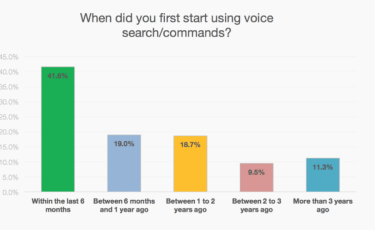
- According to Kleiner Perkins Caufield and Byers (KPCB),” 1 in 5 searches on an Android app in the USA were through speech In May 2016.”
- Since 2008 – 2016, Google voice search queries are up by over 35X over 2008. – Google Trends
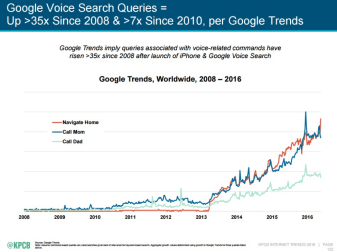
- 21% of users don’t like typing on their mobile phone, so they turn to voice search.
- Over 52% users use voice search while driving. They prefer to use voice search at times when they can’t reach their phones. This promotes safe driving! (Redesign Image)
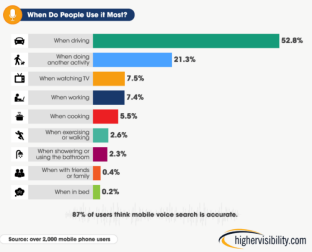
- Voice search is quicker. Humans can speak approximately 150 words in a minute in comparison to typing 40 words per minute. As a result, 43% of people prefer to use voice search as it’s much quicker than typing. (Source: Statista) In addition to it, 28% of people think that voice search is a more accurate way of searching. ~ SEO for Voice search by Katherine Watier
- About 30% of searches will be done without a screen by 2020 – thanks to technology such as Google Assistant for home, Amazon Alexa for Echo and chat bots. ~ Mediapost
- According to The Mobile Voice Study, “40% of adults use voice search to find directions while 43% of teens use voice search to call someone.”
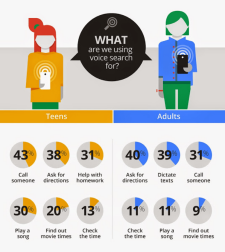
- Google found that 55% of teens and 41% of adults in the US use voice search more than once per day. There is no surprise in this – Teen are always ahead of the curve when it comes to new technology. They tend to talk to their phones more than the average adult.
- 25% of searches on Windows 10 taskbar are voice. These 25% of searches include desktop searches only! – Search Engine Journal
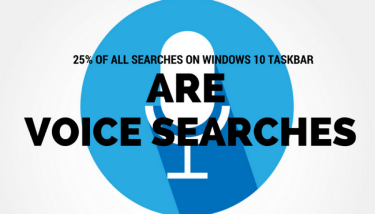
- According to Geek Wire reports, “Amazon has sold 4.4 million Echo units in its first full year of sales.”
- The voice recognition industry will go over $601 million by the year 2019. ~Technavio
- 25% of Bing searches are voice based, as are 20% of Google searches.
- Consumer usage is on the rise – 51% of consumers use voice assistants in automobiles and 39% use voice assistants in their homes indicating an increased comfort level with voice search technology. ~ Wall Street Journal
- Google’s AI has been reading nearly 3,000 romance novels in order to improve its conversational search abilities” via Click Hub
- According to Search Engine Watch “Mobile voice-related searches are 3X more likely to be local-based than text based queries.”
- According to a study by Northstar Research, 55% of US teens and 41% of US adults use Google voice search more than once a day as of October 2014. The usage of mobile voice search increased more than double between 2013 and 2014.
- The study also reveals that 56% of adults use voice search because it makes them “feel tech-savvy.”
- 43% of mobile voice search users do so because it’s quicker and easier than going on a website or using an app. (Statista, 2015)
- 50% of all searches will be voice searches by 2020. ~ Search Engine Land
- 28% think voice search is a more accurate way of searching. Katherine Watier
Conclusion
If you are a marketer get these voice search statistics in front of your clients. I’ve used them to help show my client the value of voice search. Voice search will be huge for companies that target expensive keywords like credit cards, health insurance, or divorce lawyers. These companies can target Google’s Answer box to rank high in voice search on Google Home for terms questions like “What is credit?” Brands like Coca-Cola have been testing different ways to use search. Their campaign That Place Where Coke Taste so Good
they used TV to influence searches and it will only be a matter of time before they start testing voice. Burger King used a TV commercial to target people’s Google Home devices in a very funny but invasive way. Watch and enjoy that video below.
Voice is here to stay and if you are a marketer you have to dive head first and learn this all about this new technology. We will update this list of voice search statistics as we get more of them.

